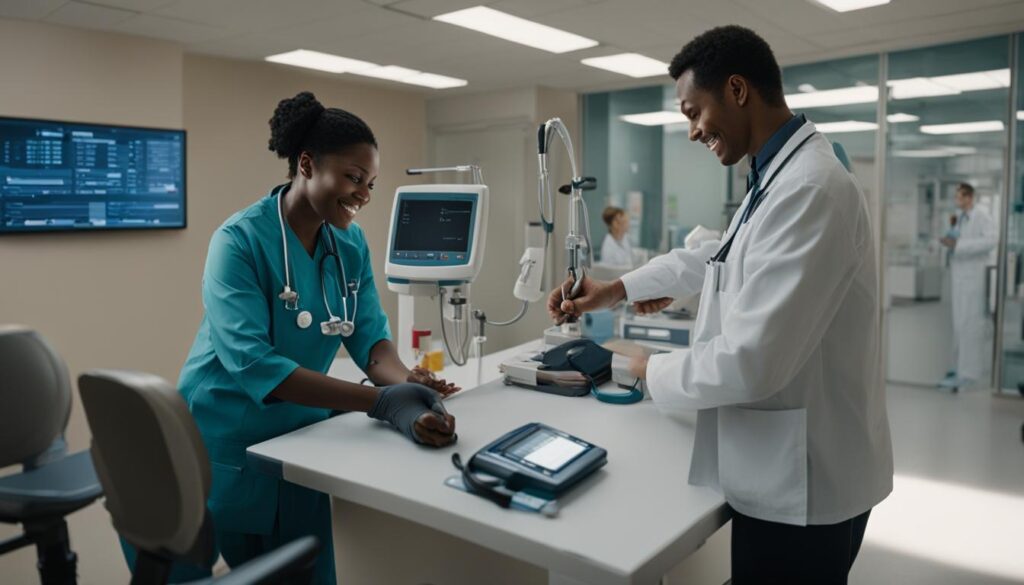Preventive health screenings are an essential part of maintaining your overall well-being. By detecting potential health issues early, these screenings can help prevent the development of chronic diseases and save you money on expensive medical treatments. Plus, many insurance plans cover preventive services without any additional costs, making it even more affordable to prioritize your health.
Screening tests, such as blood pressure checks, cholesterol tests, and cancer screenings, can provide valuable insights into your health and help catch any issues before they become serious. By taking advantage of these preventive services, you not only improve your health but also save money in the long run.
Key Takeaways:
- Preventive health screenings can help prevent chronic diseases and save you money on medical treatments.
- Insurance plans often cover preventive services without any additional costs.
- Screening tests provide valuable insights into your health and can catch potential issues early.
- Prioritizing preventive health screenings can lead to a healthier and more financially secure future.
- By discussing your family health history with your doctor, you can take proactive steps to prevent or detect diseases early.
Importance of Family Health History
Your family health history can provide valuable insights into your own health risks. If you have a family history of chronic diseases such as cancer, heart disease, diabetes, or osteoporosis, you may be more susceptible to developing these conditions yourself. By discussing your family health history with your doctor, you can take proactive steps to prevent or detect these diseases early on. Lifestyle changes, such as quitting smoking, maintaining a healthy diet, and exercising regularly, can significantly reduce your risk. Additionally, regular checkups, vaccinations, and screening tests can help catch any potential health issues before they become serious.
Risk Assessment
Understanding your family health history is like having a roadmap to your health. It helps healthcare professionals assess your risk and tailor preventive care plans specific to your needs. By knowing your genetic predisposition to certain diseases, you can make informed decisions about your lifestyle and healthcare. For example, if you have a family history of breast cancer, your doctor may recommend more frequent screenings to catch any abnormalities early.
Empowered Decision-making
Having knowledge about your family health history puts you in control of your health. Armed with this information, you can make proactive choices to prioritize preventive care and reduce your risk of developing chronic diseases. It allows you to engage in conversations with your healthcare provider, ask relevant questions, and seek the necessary screenings or interventions that align with your specific health risks. Remember, prevention is always better than cure, and your family health history is an essential tool in your preventive care arsenal.
| Disease | Likelihood of Inheriting | Recommended Preventive Measures |
|---|---|---|
| Cancer | High | Frequent screenings, genetic testing |
| Heart Disease | Medium | Regular exercise, healthy diet, cholesterol monitoring |
| Diabetes | High | Healthy diet, physical activity, blood sugar monitoring |
| Osteoporosis | High | Calcium-rich diet, weight-bearing exercises, bone density tests |
By understanding the potential health risks associated with your family health history, you can take control of your own health. Empower yourself with knowledge, engage in preventive care, and make informed decisions that can help you lead a healthier and happier life.
Coverage of Preventive Services
When it comes to maintaining your health, preventive services play a vital role. Fortunately, most health insurance plans, including Marketplace health plans, offer coverage for a wide range of preventive services. These services are designed to help you stay on top of your health and catch any potential issues before they become more serious and costly to treat.
Preventive services covered by health insurance plans include screenings for conditions such as abdominal aortic aneurysm, alcohol misuse, blood pressure, cholesterol, colorectal cancer, depression, and diabetes, among others. The coverage also extends to vaccinations and counseling for tobacco use, obesity, and sexually transmitted infections.
By taking advantage of these preventive services, you can prioritize your health without worrying about additional costs. These screenings and services are typically covered without charging a deductible or co-payment, making them accessible to individuals from all walks of life. So, don’t miss out on the opportunity to invest in your well-being and take control of your health.

Table: Preventive Services Covered by Health Insurance
| Conditions/Services | Screening/Service |
|---|---|
| Abdominal Aortic Aneurysm | Screening |
| Alcohol Misuse | Screening |
| Blood Pressure | Screening |
| Cholesterol | Screening |
| Colorectal Cancer | Screening |
| Depression | Screening |
| Diabetes | Screening |
| Vaccinations | Immunizations |
| Tobacco Use | Counseling |
| Obesity | Counseling |
| Sexually Transmitted Infections | Counseling |
By staying proactive about your health and taking advantage of the preventive services covered by your health insurance plan, you can ensure that you’re staying on top of your well-being. Regular screenings and check-ups are key in maintaining good health and catching any potential issues early on. So, make it a priority to schedule your preventive screenings and take control of your health today.
Employer-Sponsored Health Screenings
Many employers understand the importance of promoting employee wellness and offer various health screenings and check-ins as part of their employee benefits. These mini-health screenings provide valuable insights into employees’ health numbers and help identify potential risks early on. By participating in these programs, employees can take proactive steps to monitor their health and make informed decisions about their well-being.
The mini-health screenings offered by employers typically include measurements such as blood pressure, body composition, and waist circumference. These measurements can help determine an employee’s overall health status and identify any potential areas of concern. Additionally, screenings for conditions such as diabetes and osteoporosis may also be included. Regular check-ins allow employees to monitor their health numbers over time and track any changes or trends.
By participating in employer-sponsored health screenings, employees have the opportunity to gain valuable insights into their own health and take proactive steps towards prevention and early intervention. These screenings serve as a reminder to prioritize one’s health and make informed decisions about lifestyle choices and behaviors. They also provide an opportunity for employees to connect with healthcare professionals and ask any questions they may have regarding their health.
In addition to the physical screenings, many employers also offer educational workshops and webinars on various health topics. These resources provide employees with the knowledge and tools they need to make positive changes in their lives. By combining the mini-health screenings with educational programs, employers create a comprehensive wellness program that promotes a culture of health and well-being within the workplace.
Table: Employer-Sponsored Health Screenings
| Screening Type | Measurements | Conditions Tested |
|---|---|---|
| Mini-Health Screening | Blood pressure, body composition, waist circumference | Diabetes, osteoporosis |
| Additional Screenings | Depends on employer program | Varies |
Employer-sponsored health screenings not only help employees monitor their health but also contribute to a positive work environment. When employees feel supported in their wellness journey, they are more likely to be engaged and productive. These screenings demonstrate that employers value their employees’ well-being and are invested in their long-term health.

By taking advantage of the mini-health screenings and resources provided by their employers, employees can gain a better understanding of their health numbers and make informed decisions about their well-being. Prioritizing regular health check-ins, participating in educational programs, and making lifestyle changes based on the screening results can have a significant positive impact on overall health. Through employer-sponsored health screenings, individuals can take control of their health and work towards a healthier future.
Additional Options and Screenings
In addition to the standard preventive services, there are also additional screenings available for specific conditions. At the University of Arizona, eligible employees and their spouses can access confidential breast cancer screenings through the Mobile On-site Mammography service. This service includes a 3D digital mammogram with computer-aided detection, providing accurate and early detection of breast cancer. It is an essential screening option for individuals at higher risk or those who want more comprehensive breast cancer screening.
Similarly, confidential prostate cancer screenings are also provided at the University of Arizona. These screenings involve a prostate-specific antigen blood draw, a digital rectal exam, and a testicular exam. The screenings are followed by a consultation with a urologist, who can provide further guidance and recommendations. Prostate cancer screenings are crucial for identifying any potential issues early on, allowing for timely intervention and treatment if needed.
By taking advantage of these specialized screenings offered at the University of Arizona, individuals can ensure they receive the most comprehensive care for breast and prostate cancer. Early detection plays a crucial role in improving outcomes and increasing the chances of successful treatment. These screenings provide individuals with peace of mind and potentially save them from costly treatments.

Breast Cancer Screening Options
| Screening Option | Description |
|---|---|
| Mobile On-site Mammography | Confidential breast cancer screening service provided at the University of Arizona, offering a 3D digital mammogram with computer-aided detection. |
Prostate Cancer Screening Options
| Screening Option | Description |
|---|---|
| Confidential Prostate Cancer Screening | Includes a prostate-specific antigen blood draw, a digital rectal exam, and a testicular exam, followed by a consultation with a urologist at the University of Arizona. |
Conclusion
Prioritizing preventive health screenings offers both physical and financial benefits. By taking proactive steps to monitor your health, you can catch potential health issues early on, reducing the need for expensive treatments in the future. Regular screenings can help detect and prevent chronic diseases, allowing you to maintain a healthier and more fulfilling life.
Not only do preventive health screenings contribute to your overall well-being, but they can also save you money. Many insurance plans cover a wide range of preventive services without any additional costs. By taking advantage of these covered services, you can access the care you need without breaking the bank.
Remember to discuss your family health history with your doctor, as it can provide valuable insights into your own health risks. By combining this information with regular preventive screenings, you can take informed and proactive steps towards maintaining your health. Additionally, participating in employer-sponsored screenings and check-ins can further enhance your understanding of your health and provide valuable resources for disease prevention.
Prioritize your health by investing in preventive health screenings. By doing so, you can not only improve your well-being but also enjoy the financial security that comes with being proactive about your health. Take control of your future by making preventive health screenings a priority in your life.
FAQ
What are preventive health screenings?
Preventive health screenings are tests or examinations performed to detect potential health issues before symptoms develop. These screenings can help prevent the development of chronic diseases and save you money on costly medical treatments.
Why is family health history important?
Family health history can provide valuable insights into your own health risks. If you have a family history of chronic diseases such as cancer, heart disease, diabetes, or osteoporosis, you may be more susceptible to developing these conditions yourself. Discussing your family health history with your doctor can help you take proactive steps to prevent or detect these diseases early on.
What preventive services are covered by health insurance?
Most health insurance plans, including Marketplace health plans, are required to cover a wide range of preventive services without charging a deductible or co-payment. These services include screenings for conditions such as abdominal aortic aneurysm, alcohol misuse, blood pressure, cholesterol, colorectal cancer, depression, diabetes, and more. Vaccinations and counseling for tobacco use, obesity, and sexually transmitted infections are also covered.
Do employers offer health screenings?
Yes, many employers offer health screenings and check-ins as part of their employee benefits. These screenings typically include measurements such as blood pressure, body composition, and waist circumference, as well as tests for conditions like diabetes and osteoporosis. Regular health check-ins can help you monitor your health and identify any potential risks early on.
Are there additional screenings available for specific conditions?
Yes, there are additional screenings available for specific conditions. For example, eligible University of Arizona employees and their spouses can receive confidential breast cancer screenings through the Mobile On-site Mammography service. Similarly, confidential prostate cancer screenings are also provided. These specialized screenings can help detect and prevent these specific types of cancer, providing you with peace of mind and potentially saving you from costly treatments.
How do preventive health screenings benefit my finances?
By taking proactive steps to monitor your health through preventive screenings, you can catch potential health issues early on, reducing the need for expensive treatments in the future. Additionally, many insurance plans cover preventive services without additional costs, allowing you to access the care you need without breaking the bank.
Can Financing Dental Care Help Boost Your Finances in the Long Run?
Financing dental care made painless can have long-term benefits for your financial well-being. By spreading out the cost of necessary procedures over time, you can alleviate the immediate financial burden and maintain a healthy smile without draining your savings. It allows you to prioritize your oral health without compromising other important financial goals. Invest in your dental care today to boost your long-term finances tomorrow.

